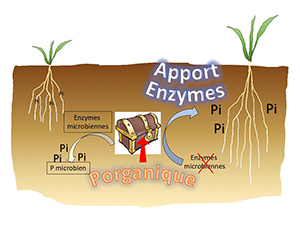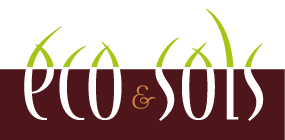 Enzyme-functionalized nanomaterials to use soil organic P reserves for agriculture
Enzyme-functionalized nanomaterials to use soil organic P reserves for agriculture
Many authors have drawn attention to the risk of a shortage of phosphate fertilizer production due to the foreseeable depletion of P mineral deposits. The problem is global, but is even more acute for Europe, which has a very few deposits of P, which makes its agriculture very dependent on imports and moves it away from a goal of global food self-sufficiency in a politically changing world.
In this context, FORAGE aims to develop new products in the fertilizer industry based on nanomaterials functionalized with enzymes to improve the supply of phosphate to agriculture from the high reserves of organic P (Po) in the soil, generally inaccessible to plants. In order to be accessible, the various forms of Po must be hydrolyzed by enzymes able to release the orthophosphate group (Pi), the only form of P absorbed by the roots. These enzymes are produced (i) when a strong Pi deficiency is occurring in the soil solution and (ii) especially by microbial populations which sequester mineralized Pi in their biomass, at the expense of the plant. Thus, when the soil conditions are favorable for the mineralization of Po, crops cannot benefit from it and are deficient in P, which compromises agricultural production.
Objectives
The general objective of FORAGE is to find ways to accelerate the mineralization of Po from the soil for the benefit of crops by short-circuiting the competition of microbial populations for mineralized Pi by the direct supply of enzymes protected by nanomaterials.
FORAGE then has the following sub-objectives:
- To produce different candidate enzymes using recombinant technologies and Pichia pastoris
- To establish the substrate specificities of each enzyme, in the presence and absence of soil
- To establish the best enzyme encapsulation processes, from the laboratory to the industrial scale
- To test the effectiveness of these new enzyme-based fertilizers on the P nutrition of species of agronomic interest, grown in pots.
Dates
FORAGE duration is 42 months, from 2018, 01/11 until 2022, 31/03
Partners
- Institut de chimie moléculaire et des matériaux – Institut Charles Gerhardt Montpellier
- UMR Iate Institut Agro-Montpellier
- Institut de chimie moléculaire de Reims, Université de Reims
- Agro Innovation International, Groupe ROUILLIER, St Malo
Fundng
ANR
Contact and Informations
Plassard Claude, UMR Eco&Sols, INRAE Montpellier
email :






